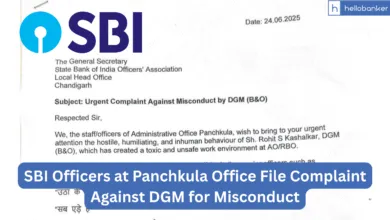Govt Banks won’t allow Investigation Agencies to probe their Employees without Permission

| ➡️ Get instant news updates on Whatsapp. Click here to join our Whatsapp Group. |
MUMBAI: Government-owned banks are expected to inform the finance ministry that they will continue to withhold permission for investigative agencies to probe their employees unless substantial evidence of wrongdoing is presented.
The finance ministry is holding a meeting today (Wednesday) with the CEOs and Chief Vigilance Officers (CVOs) of public sector banks to address ongoing tensions between banks and investigative agencies probing officials for alleged fraud. Bankers argue that investigations are often initiated based on suspicion rather than evidence, leading to humiliating raids and inquiries that negatively impact employee morale. “These actions demoralize employees who are not even under suspicion,” said a senior banker.
Investigative agencies, on the other hand, claim that the lack of cooperation from banks has created a significant backlog of unresolved cases.
Legal Context
Under the amended Section 17A of the Prevention of Corruption Act (2018), investigative agencies require prior approval from the management of banks to initiate probes against their employees. While this law applies to both public and private sector banks, private banks fall outside the direct jurisdiction of these agencies but still require management approval for investigations.
Over the past year, agencies like the Central Bureau of Investigation (CBI) and the Vigilance Commission have raised concerns about delays in resolving hundreds of cases due to the banks’ refusal to grant permissions. Most of these cases involve frauds where banks have already filed First Information Reports (FIRs) to recover non-performing loans. However, the FIRs often target “unknown bank officials,” leading agencies to seek approval to investigate specific employees.
Banks’ Stance
At today’s meeting, bankers are expected to present the following points to the finance ministry:
- Requirement for Material Evidence: Investigative agencies must provide concrete evidence linking bank employees to fraudulent activities, such as collusion with borrowers or wrongful personal gains. Simply labeling a transaction as a loss for the bank is insufficient to justify approval for an investigation.
- Intent vs. Process Deviations: Banks will argue that deviations from established procedures should not automatically be equated with fraudulent intent. Decisions should not be judged retrospectively based on loan defaults.
- Interrogation Protocols: Bankers will recommend that employee interrogations should take place on bank premises rather than at agency offices such as those of the CBI or Enforcement Directorate (ED).
Proposed Resolution
To address these issues, the Indian Banks’ Association (IBA) has formed a committee led by former CBI director DC Jain. The committee has suggested that banks allow agencies to conduct preliminary inquiries, as most investigations begin based on suspicion.
The meeting is expected to focus on balancing the need for thorough investigations with protecting bank employees from undue harassment, ensuring that cases of genuine wrongdoing are addressed without undermining employee confidence or morale.

Bankers are protected under Section 17A of the Prevention of Corruption Act, 1988, which mandates prior approval from the competent authority before proceeding with an inquiry or investigation against a public servant. Similarly, Section 19 of the Act requires prior sanction for prosecution. However, under Section 197 of the Code of Criminal Procedure, 1973, no prior sanction is required to prosecute a banker, as they are not considered “public servants” under this section.
Ironically, despite the similarities between Section 19 of the PC Act and Section 197 of CrPC, bankers are still prosecuted under Section 197 of CrPC, primarily because most cases involve provisions of the Indian Penal Code (IPC) such as Sections 120B, 409, 419, 420, 467, 468, and 471, along with Sections 13(1) and 13(2) of the PC Act. Agencies like the CBI or ED, when seeking sanction, typically reference Section 19 of the PC Act without mentioning Section 197 of CrPC.
The Supreme Court, in its recent judgment in A. Sreenivasa Reddy vs. Rakesh Sharma & Anr., 2023 SCC OnLine SC 952, clarified in paragraph 47 that Section 197 of CrPC does not apply to bankers working in nationalized banks, even though they are treated as public servants. This judgment, therefore, favors the prosecution rather than providing relief to bankers accused under such provisions.
Due to this legal ambiguity, even innocent bankers are being prosecuted and subjected to prolonged judicial processes, which could deter potential candidates from pursuing careers in the banking sector. The fear of unwarranted prosecutions and lifelong legal battles may significantly impact future recruitment and the overall morale of bankers.
The government must reconsider these provisions and their implications, ensuring adequate safeguards for bankers while addressing genuine cases of misconduct. Additionally, the Supreme Court should provide clarity on the interpretation of Section 197 of the CrPC, specifically regarding why bankers are not considered public servants under this section, despite being recognized as such under the Prevention of Corruption Act. A uniform interpretation is crucial to prevent misuse of the law and protect the interests of those working in the banking sector.